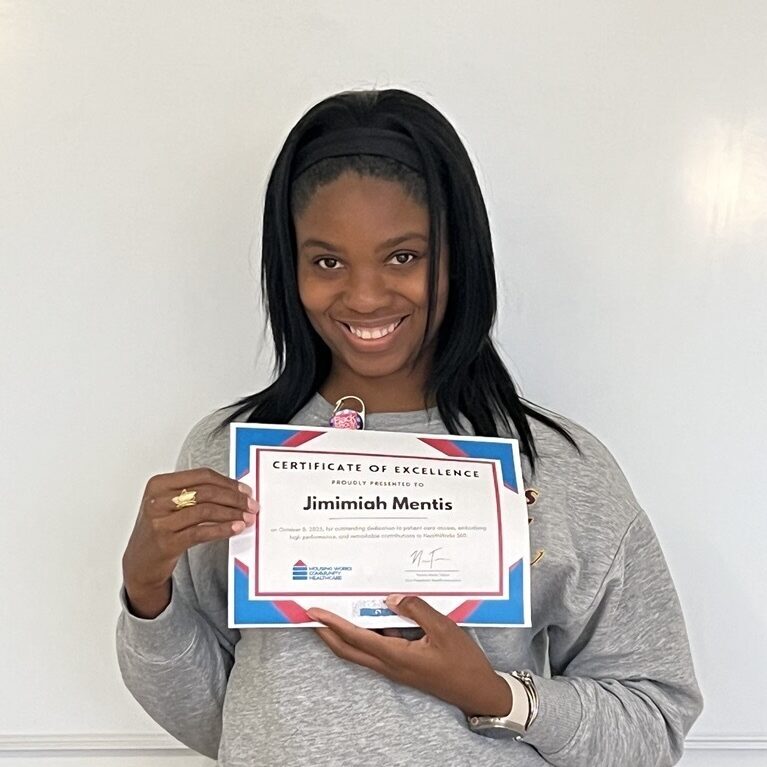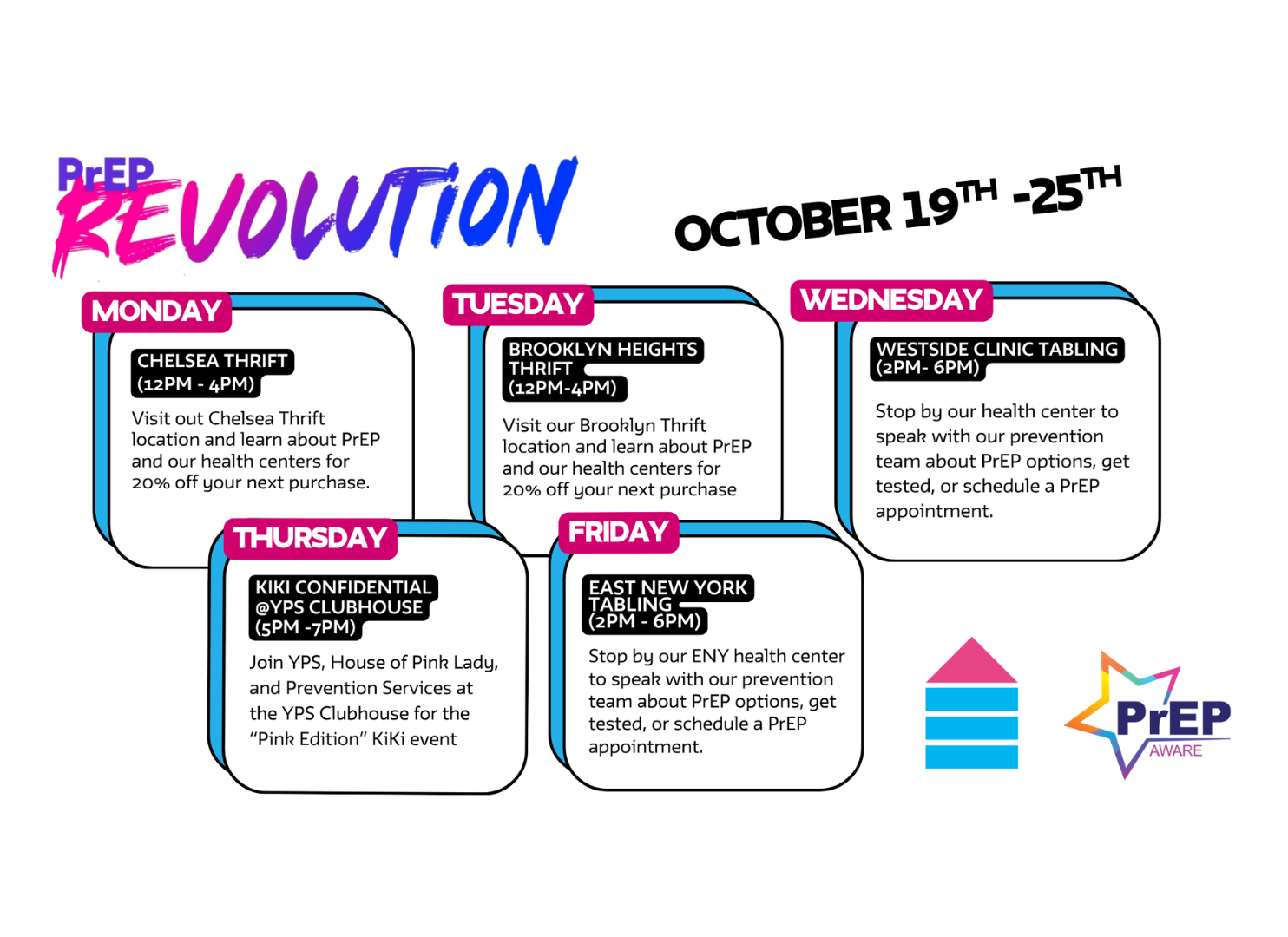This month we sat down with Dr. Remmy Peterson, a psychiatric provider at our 125th Street Community Health Center, who talked to us about our new esketamine therapy for treatment-resistant depression. Spravato (esketamine) is a nasal spray therapy approved by the FDA for treatment-resistant depression (TRD) and major depressive disorder (MDD). Esketamine is a fast-acting novel antidepressant derived from ketamine. Housing Works’ 125th Street Community Health Center is a REMS certified clinic which allows safe administration of esketamine.
Idso, Sophia
I first just wanted to get a background on you and your training as a psychiatric provider. Can you tell us a little more about yourself?
Peterson, Remmy
Yes, I have a doctorate in psychiatric nursing from Columbia University. I also have a master’s in nursing science from Columbia as well. While I was doing my doctorate at Columbia, I was working as a registered nurse at a private practice that administered TMS, which is transcranial magnetic stimulation therapy; we also did ketamine infusions and esketamine, which is a nasal spray treatment that we're now introducing at Housing Works. Once I became a psychiatric nurse practitioner, I was hired to prescribe the medication. I was also simultaneously working at another community clinic in the South Bronx, and now I'm here at Housing Works.
Idso, Sophia
Could you tell us a little bit more about ketamine as a drug and esketamine treatment specifically. What is it and what is it used for?
Peterson, Remmy
Ketamine historically has been used as an anesthesia. While performing certain procedures that require ketamine for anesthesia, they noticed that a lot of patients were reporting less depression, less anxiety, a sense of euphoria, and a sense of connectedness to the community or to their loved ones in their interpersonal relationships - so then that snowballed research in terms of ketamine being used for mental health disorders. Esketamine, which is a nasal spray that will be offered at Housing Works, acts on the glutamate system in your brain which helps regulate your memory, your mood, your sleep, and your ability to learn as well. It's a great medication that's been approved for treatment-resistant depression. It's also been approved for PTSD, or folks who have gone through traumatic events in their life or any kind of abuse in their childhood or their relationships. I really think it's a great medication especially in the community context where there are marginalized populations and minority communities that have higher incidences of trauma or abuse. I'm really happy to bring that to Housing Works because it's much needed for the population.
Idso, Sophia
I also wanted to ask about how the treatments administered. I know you said it's a nasal spray, so can you walk us through how that works and what patients can expect to feel?
Peterson, Remmy
The initial treatment course is 8 weeks. For the first four weeks, patients will come into the health center twice a week. During each visit to the health center, the patient will have a total of 3 nasal spray devices administered in the span of 15 minutes, and then they will be monitored in the health center for the next two hours. Usually, folks can anticipate a feeling of sedation or dissociation, or ego dissolution. They might have spiritual experiences, sometimes they may have mild hallucinations or see certain colors or have visions that can help them in whatever mental health issues they're experiencing at the time.
Idso, Sophia
You said the initial treatment course is 8 weeks. In terms of what continued treatment looks like, is it always just the eight weeks? Or is the treatment course tailored to the patient?
Peterson, Remmy
Yes, it is 8 weeks initially. During the first four weeks, patients will come to the health center twice a week for treatment, and then for the remaining four weeks patients will come to the health center once a week for treatment. After that, we assess if this has been a helpful treatment for the patient, at that point we'll get a sense of if there has been any relief in the symptoms of depression, anxiety, or trauma. If the medication was beneficial, usually folks opt in to do maintenance, and that can look a little bit different for everyone. Some people report the antidepressant effects of esketamine lasting for a week, or two weeks, or a month. That will give us insight into what the appropriate frequency is for each patient. Unfortunately, there are a small percentage of folks that don't respond to this medication. Some people, due to their trauma history, might feel uncomfortable being in a vulnerable state in a clinical setting, so it's not for everyone, but it is something that has been very helpful. I really enjoy prescribing it, compared to your traditional antidepressants that have to be taken every day for long periods of time which can have long term implications as well, but esketamine, usually it's the eight-week treatment, and people tend to feel better pretty quickly.
Idso, Sophia
That’s great to hear. I wanted to see if you could talk a little bit about your experience previously administering esketamine and some feedback you received from patients.
Peterson, Remmy
A lot of folks I've treated have tried the traditional antidepressants, they've tried many different classes of antidepressants, SNRI’s, SSRI’s, and they'll tell me they really don't find much relief in terms of their depression. Once they do start esketamine, I get to really witness people's relief and happiness to be able to enjoy the things that bring them joy that they didn't really find joyful before. I would say just hearing from folks that this medication has been the only thing that has really helped their depression after trying so many different things. You know, it's something that I continually hear from a lot of patients who have been in psychiatry for so long and haven’t found the right medication.
It feels good being able to provide my patients this medication and coming in at the end of a long history of depression, trauma, etc. and being able to say 'we found something that works'. Because esketamine is very, very effective.Remmy Peterson, DNP, PMHNP-BC
Idso, Sophia
Definitely. I think there also can be a little bit of stigma around the treatment because the drug ketamine itself is used recreationally. Can you speak to your thoughts on the stigma around it and the importance of having esketamine as a treatment option for patients?
Peterson, Remmy
Yes - of course there is a stigma with ketamine, but the same stigma exists for psychiatric medications in general or even just being a psychiatric patient or seeing a therapist. But I think the stigma, particularly with medications, shouldn't exist. I think people use medications, whether they're illegal or not, to feel better. I think that substances shouldn't be criminalized and we shouldn't punish people for using substances, especially if they're trying to make themselves feel better when they’ve experienced a lot of trauma or a lot of depression in their life. There's also a lot of stigma with coming to clinics. There are marginalized populations, specifically black people have trauma in the context of clinical settings, medicine, experimentation and racism. I think alleviating that stigma is really important for our communities, so people can start to feel better and not feel ashamed about using a substance. The goal is to really help people heal.
I think alleviating that stigma is really important for our communities, so people can start to feel better and not feel ashamed about using a substance. The goal is to really help people heal.Remmy Peterson, DNP, PMHNP-BC
Special thanks to Dr. Remmy Peterson for this interview. Dr. Peterson will be administering this treatment at our 125th Street Community Health Center. If you are interested in treatment, have your psychiatrist fill out a referral form today!




